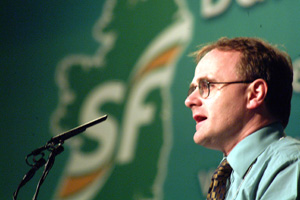4 March 2004 Edition
Sellafield and incinerators rejected
BY ROISIN DE ROSA

Barry McElduff
The Ard Fheis passed a wide range of important resolutions on protection of our environment and on waste management. Resolutions also reflected an increasing concern at government neglect of alternative sources of energy, and the abject failure of the Dublin Government to even attempt the introduction of policies to enable Ireland to comply with our Kyoto commitments to reduce CO2 emissions.
Arthur Morgan led off the debate calling for the closure of Sellafield, supported by Barry McEduff, who told of his visit to Sellafield where he had seen a notice counting the accident free days, which had stood that day at 19. 42 days had been the record for accident free days at the plant. "We cannot afford to wait for Chernobhyl to happen at our border with England," he said.
Much of the debate concentrated on opposition to the government's declared intent of introducing, as Daithí Doolan put it, "a hazardous waste incinerator for every region of Ireland". There were angry condemnations of the minister's legislation to deny local authorities their power to determine waste management policies that reflect the views of people in the constituencies.
Barry McElduff supporting the call from several cumainn for "an all-Ireland waste management strategy that opposes incineration and is based on a Zero Waste policy, with an integrated strategy to reduce, reuse and recycle the waste we produce". He spoke of the discovery only two days before of waste, from Minister McDowell's Justice Department, which was found illegally dumped, across the Border at Iskra, in Tyrone. "Was that a guide to the approach of the Dublin Government to the dumping of waste across the border by illegal and criminal gangs?" he asked.
The debate then considered a number of resolutions calling for all-Ireland policies to exploit alternative sources of energy, and calling on the Dublin Government to reduce CO2 emissions through a phased introduction of a carbon tax. Speakers roundly slammed the government policy of emissions trading, which evades our responsibility to reduce pollution in line with our Kyoto obligations.
Instead, we should be looking at all-Ireland policies to address the needs of the many thousands living in fuel poverty through social economy projects through which local communities can develop the immense resources Ireland enjoys for the production of clean energy through windpower and wave power. Resolutions were passed unanimously calling on the Dublin Government to explore renewable energy and to support the development of alternative energy sources on an all-Ireland basis, noting that "the sun, wind and water are in public ownership and should remain so".
